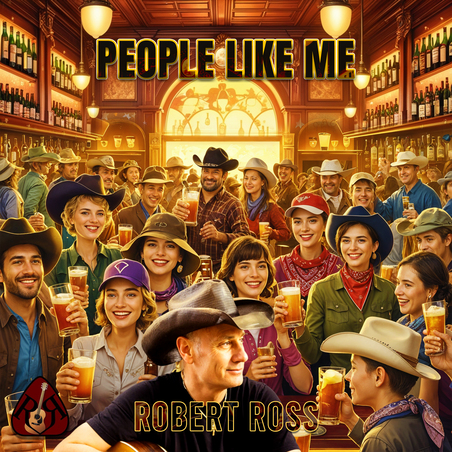
Every now and then a song comes along that feels less like a polished product and more like an old friend pulling up a barstool next to you, ready to swap stories until the neon signs blur. Robert Ross’ “People Like Me” is that kind of song. It is unvarnished, heartfelt, and honest as a pair of scuffed-up work boots leaning against a back porch door.
Coming hot on the heels of his New Music Weekly Top 25 smash “Better With Time” (which, true to its title, is still aging like a fine whiskey on the charts), “People Like Me” is not about chasing trends or overthinking the art. It is about tipping your hat to the lifeblood of this country: the grinders, the dreamers, the ones who work all day and play all night, or at least until the alarm clock says otherwise.
“People like you and people like me, we like to drink,” Ross belts in the opening salvo, and it is an instant handshake, a pact made over cheap beer and shared laughs. The groove kicks in like a pickup roaring down a dusty road, guitars spinning their wheels in a satisfying blend of Southern crunch and classic country twang. There are no frills here, no filters, no filler, just the kind of unpretentious spirit that built the bars, the backroads, and the ballparks of America.
Ross’ voice is a bourbon-soaked drawl, carrying the weary wisdom of a man who has lived every line he sings. When he proudly proclaims he is “never gonna be something that I’m not,” you believe him, not because it sounds clever, but because it sounds lived-in. There is a worn denim authenticity to everything about this track, a quality that so many modern country artists try to fake and so few can truly summon.
But “People Like Me” is not just a beer-chugging barnburner. Dig a little deeper and you will find a hard-earned reverence woven into its barstool bravado. In the second verse, Ross shifts the spotlight from the everyday drinkers to the everyday doers: the soldiers, the first responders, the quiet heroes who hold the line so the rest of us can clink our glasses in peace.
“We raise our glasses to the ones that save our ass,” he sings, and there is a lump-in-the-throat gratitude that cuts through the raucous cheer. In that one line, Ross bridges the gap between Saturday night revelry and Sunday morning respect. It is an emotional sleight of hand that gives “People Like Me” more gravity than your typical “let’s party until we drop” anthems.
The production, much like the message, keeps it simple and strong. There is no Auto-Tune, no over-polished sheen. Just a band of brothers laying it down like they are playing the last set before closing time, hearts on their sleeves and calluses on their hands. The lead break is a sun-bleached swagger of electric guitar that is as gritty and reliable as a handshake deal at a county fair.
Ross has always worn his influences proudly, from the outlaw poets to the honky-tonk heroes and the heartland prophets. What sets him apart is the way he filters those traditions through his own lens. He is not imitating anybody. He is telling his story, in his voice, for his people. In doing so, he taps into something bigger than himself: a spirit of community, resilience, and realness that feels rare in today’s algorithm-choked landscape.
“People Like Me” is not trying to reinvent the wheel. It is reminding you why the wheel was invented in the first place, to keep rolling, to keep moving, to keep carrying us all home after a long day’s work. It is a drink raised not in reckless abandon, but in gratitude. It is a party song with a purpose, a rowdy shout-out to the ones who rarely get shouted out.
In the end, Robert Ross does not just write songs. He builds them, brick by brick, note by note, with the kind of hands that know what it means to break a sweat and earn a living. “People Like Me” is his latest labor of love, and like the best nights spent with good friends and cold drinks, it lingers long after the last note fades.
Here is to the doers. Here is to the dreamers. Here is to Robert Ross, one of the real ones.
–Lonnie Nabors
